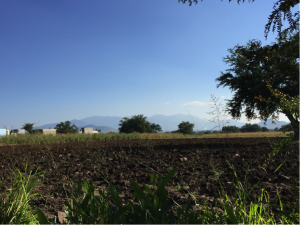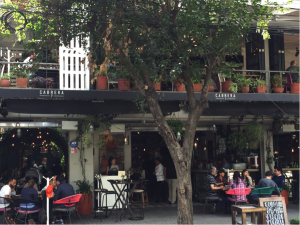My Country, 1,2,3
TAXI
11/21/2017
When we travel, we like to use public transport, but last month we took two fairly long taxi rides, as well as a bus ride, a hike, and a brief motorcycle jaunt to Tlacalula and Yaguil, Oaxaca, and the two taxi drivers we met inadvertently taught us as much about our world as did the sites we visited.
Each ride took some time, and since we’re glad to practice our mediocre Spanish, we asked the drivers about their families and told about ours. When we mentioned that our children are living on the East coast and in Costa Rica, while we live in California, our first driver, Gustavo, expressed surprise and concern for us — why are they so far away? Are there problems? This man could barely conceive of family being separated by thousands of miles. (His attitude reminded me of an entry in Lillian Schlissel’s Women’s Diaries of the Westward Journey from around 1840, expressing dismay that a friend might move 12 miles away, let alone all the way across the country. ‘Why would anyone do such a thing?’)
But Antonio, our taxi driver on the return trip, didn’t wonder at all. He was impressed at what our children were doing, and he was proud that his own daughter was studying languages at the university and planned to spend next fall in California and then the Spring in France. He was working hard to help her afford it.
So, if we were to make a sweeping generalization about these men, we could say that the first driver was living in the local, traditional world, and the second one in the modern, global one.
It’s obvious which world I live in, but it’s not obvious that it’s completely better.
After all, my wife and I would really love our children to be closer to home. Why is it now common for so many Americans (and Canadians, Chinese, Australians, etc.) to send their children across the country, and then, across the world, to study or work, or just travel? Obviously, to see that the world offers us different climates, cultures, peoples, lifestyles. We believe travel helps our children be more independent, that it broadens their horizons, expands their knowledge, gives them new tools for career and understanding. I for one have little doubt this is true . . . just as reading can bring us to new worlds, just as my own travels have done.
But what do we lose? Time together. Physical presence. And perhaps, over time, a loosening of our bonds. We might fall in love, get a new job, postpone visiting, spend less and less time together, and then stop altogether.
This is probably what the first driver feared — that he’d lose control over and perhaps the love of, and connection, to his children. But, trying hard not to pontificate, we said that this could happen in any case, and it’s hard to believe that he can love his kids any more than we do ours.
Nearness is not merely a physical thing — we can in fact be alienated from someone right near by, and we can feel great affection for someone far away. Sadly, there are people who won’t talk with family members who live in the same town. And on the other hand, thanks to modern technology, we can see and talk with our family and friends almost constantly (something that can hinder the independence we want to provide our children so that they can explore on their own).
Despite the difference in the two men’s attitudes, I found both of them to be very nice, and I guess that transcends the issue of whether one lives in the “traditional” or “modern” world.
So, yes, we paid some money to these taxi drivers, but we had an invaluable experience being with them. We shared an hour of conversation with them, and I hope they feel we gave them something meaningful beyond the pesos. That’s travel.
By the way, “taxi” is a Greek word meaning “travel,” and kalo taxithi is the way Greeks wish you good travels, bon voyage (as the French would say). We are always traveling, even at home — in dreams, books, television, the internet, and in our imaginations. You do not have to travel very far to realize that each of us is already on the trip of a lifetime.
As we set out
As we set out, the world is open, or as one peculiar philosopher said, “the world worlds.”

